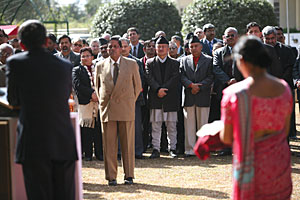 KIRAN PANDAY |
Hot on the heels of the news that Rastriya Janashakti Party chief Surya Bahadur Thapa will be meeting almost everyone that matters in the Indian National Congress (INC) during his 'health trip' to New Delhi, reports indicate that Maoist supremo Pushpa Kamal Dahal will be heading north for a tete-a-tete with President Hu Jintao and other luminaries of the Communist Party of China.
The announcement of some NC honcho's visit to Europe or a few UML apparatchiks' planned trip to Scandinavian countries is awaited. MJF President Upendra Yadav will probably be heading for the US once again. Just as almost all local NGOs have their patrons abroad, each political party in Nepal has collaborators outside Nepal.
India continues to be the decisive player in Nepali politics, although its hegemony is no longer absolute. The Nepal Army used to be its most faithful partner. Since the Indians were the main source of arms and training opportunities, they considered the Nepal Army an extension of their own defence forces. The relationship began to sour when Nepal Army officers somehow got the impression they were fighting nothing less than the irregulars of Indian armed forces in the guise of Maoists.
The first elected government under the Nepali Congress angered Indian strategists by allowing Israel and Pakistan to open embassies in Kathmandu and by independently cultivating powerful leaders in Europe and the US. But the turning point was BP Koirala's Beijing visit in March 1960, when Chairman Mao Zedong and Premier Chou Enlai rolled out the red carpet for their Nepali guests. Indians have viewed the Nepali Congress with suspicion ever since.
Despite their apparent cosiness, the Indian establishment perceives UML to be merely a political front for the Nepal Army and prefers to deal with the stalwarts of Balkhu Palace on a personal rather than organisational basis. In New Delhi, most Madhesi leaders are treated with contempt. It's not just South Block bureaucrats, even Indian politicos sneer at the various Sadbhavana factions and ridicule MJF splinter groups.
Janardan Dwivedi, the AICC General Secretary who heads the training, media and party organisation department of the Nehru-Gandhi party, was recently in Kathmandu. During a reception held in his honour, his body language was indicative of the relative importance the Indian establishment gives to competing political parties in Nepal.
With Nepali Congress hotshots such as Bimalendra Nidhi, Prakash Sharan Mahat and Minendra Rijal - some of the most vociferous supporters of the 22-party anti-Maoist coalition - Dwivedi was warm, but hardly friendly. Towards other Nepali Congress leaders such as Sushil Koirala and Ramchandra Paudel, he was friendly, but far from warm. With Bijaya Gachhadar of MJF-D and Rajendra Mahato of Sadbhavana, he didn't make any attempt to hide his condescension.
TMLD leaders stood like obedient students in the presence of the former Associate Professor of Delhi University. UML bigwigs were dismissed with a polite nod and a reluctant smile. It was only when being introduced to Barsha Man Pun and Hisila Yami of the Maoists that a hint of grudging respect could be detected in the demeanour of the veteran INC leader. Clearly, the political class in India realises that the Nepali Maoists have outgrown its late nineties tutelage and deserve the courtesy due to equals. The same is however not true of babus and bureaucrats.
Professor SD Muni once chastised South Block diplomats as a bunch of trader baniyas who insisted on immediate return on investments made in neighbouring countries. His characterisation is even truer today, as diplomats want to see Nepali Maoists transformed into mainstreamers before they retire. They don't realise the consequences of such an abrupt end to the decade-long armed struggle on its leadership.
The Maoists believe that the Indians have done them no favours. Like most Brahmins, they consider beneficence from baniyas their birthright. A Brahmin is not supposed to be grateful for anything he receives, for what he gives in return - blessings - is considered to be of higher value. Dwivedi is a Brahmin from Chitrakoot. If Nehru-Gandhi loyalist Surya Bahadur Thapa corroborates Dwivedi's assessment of Nepal's power politics, Dahal may yet repent of his decision to hobnob with Beijing.



